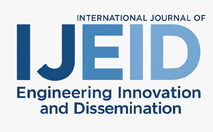Author Guidelines
International Journal of Engineering Innovation and Dissemination (IJEID) is a peer-reviewed, biannual journal published by VirtualRealia.Org. The journal focuses on disseminating innovative research that bridges the gap between theory and practice in engineering. IJEID welcomes high-quality contributions from various engineering disciplines, including interdisciplinary studies, that address real-world challenges, propose novel solutions, and advance engineering practices.
Submission Requirements
Language
- Manuscripts must be written in English. Authors are encouraged to use professional editing services if needed.
Article Types
- Original Research Articles: Comprehensive studies presenting new findings or methodologies.
- Short Communications: Brief but significant findings, preliminary data, or novel ideas (max 3,000 words).
- Review Articles:
- Comprehensive Reviews: In-depth analyses of trends, challenges, and research opportunities.
- Mini-Reviews: Concise evaluations of emerging or specific topics.
- Theoretical Articles: Contributions developing or critically evaluating theoretical frameworks.
- Case Studies: Real-world applications or practices with actionable insights.
- Methods and Protocols: Detailed descriptions of innovative methodologies or tools.
Article Length
- Original Research Articles: 8–12 pages.
- Review Articles: Up to 20 pages.
- Short Communications: Maximum 3,000 words.
- Articles exceeding these limits may be considered at the editor’s discretion.
Formatting Guidelines
- Manuscript Template: Download the official template from: Download Template.
- File Format: Submit in MS Word or LaTeX format with figures and tables uploaded separately.
- Font and Layout:
- Font: Times New Roman, 12 pt, 1.5-line spacing.
- Margins: 1 inch on all sides.
- Include page numbers in the footer.
Manuscript Structure
- Title Page:
- Title: Concise and descriptive, avoiding abbreviations.
- Author Details: Full names, affiliations, and the corresponding author’s contact details.
- Abstract:
- Maximum 250 words summarizing objectives, methods, key findings, and implications. Avoid citations.
- Keywords: Provide 3–7 keywords for indexing.
- Main Body:
- Introduction: Background, research problem, and objectives.
- Literature Review: Relevant studies and research gaps.
- Methodology: Research design, data collection, and analysis methods.
- Results: Data and findings with appropriate tables or figures.
- Discussion: Interpretation of results and their relevance.
- Conclusion & Recommendations: Significance and practical applications.
- References:
- Use APA citation styles.
- Include at least 10 references, formatted consistently with DOIs where available
- Figures and Tables:
- All figures and tables must be included directly within the manuscript.
- Tables should have captions placed above them, while figures should have captions placed below.
- Ensure all figures and tables are properly referred to within the text for clarity and coherence.
- Graphical content must be of high resolution (minimum 300 dpi) to maintain quality.
Ethics and Compliance
Research Ethics
- Authors must adhere to ethical research practices and comply with local and international guidelines. Ethical considerations include minimizing harm, obtaining informed consent, and ensuring data integrity.
Ethics in Publishing
- Plagiarism, duplicate submissions, and data fabrication are strictly prohibited. All manuscripts are screened for plagiarism, and submissions must have a similarity index below 10%.
AI Usage Disclosure
- Generative AI tools may be used for language refinement (e.g., grammar checks) but must not exceed 10% of the manuscript content.
- Any AI use must be disclosed at the end of the manuscript.
Inclusive Language
- Use gender-neutral language and avoid stereotypes or discriminatory expressions. Respect diversity in age, gender, ethnicity, and disability.
Conflict of Interest
- Authors must disclose any financial or personal interests related to the research. Use the Declaration of Interests form during submission.
Peer Review Process
Submission
- Submit manuscripts through the IJEID portal: Submit Manuscript. Authors will receive confirmation upon submission.
Review Process
- IJEID follows a double-blind peer review process:
- Manuscripts are reviewed for scope and quality by editors.
- Suitable manuscripts are sent to at least two expert reviewers.
- Decisions are made based on reviewer feedback: accept, accept with revisions, or reject.
Proofs
- Authors will receive proofs of accepted manuscripts. Corrections should be returned within two days. Significant changes are not permitted at this stage.
Open Access and Publication Fees
Open Access Policy
- Articles are freely available under a Creative Commons Attribution (CC BY) license, enabling global accessibility.
Publication Fees
- No submission fee.
- Article Processing Charge (APC): 50 USD (up to three authors, additional authors $10 each).
- After acceptance, you will receive a PayPal invoice to proceed with the payment of the Article Processing Charge (APC).
- After Payment: Send through email the invoice or proof of payment with the final manuscript and signed copyright form to the editor: ijeid-editor@virtualrealia.org.
- Authors retain copyright but grant IJEID the right of first publication.
Data Sharing and Research Transparency
- Authors are encouraged to share data in trusted repositories (e.g., Mendeley Data, Figshare) and provide a Data Availability Statement in the manuscript. If data cannot be shared, provide a valid justification.
Submission Checklist
Ensure the following before submission:
- One author is designated as the corresponding author with complete contact details.
- The manuscript is prepared using the IJEID template.
- All authors’ affiliations and contributions are listed.
- Ethical disclosures (e.g., conflicts of interest, AI use) are included.
- The manuscript adheres to formatting guidelines and has a similarity index below 10%.
Contact Information
For inquiries, please contact the editorial office at ijeid-editor@virtualrealia.org
Failure to meet these thresholds may result in the rejection of the manuscript or a request for revision to address concerns regarding originality and compliance with ethical standards.
